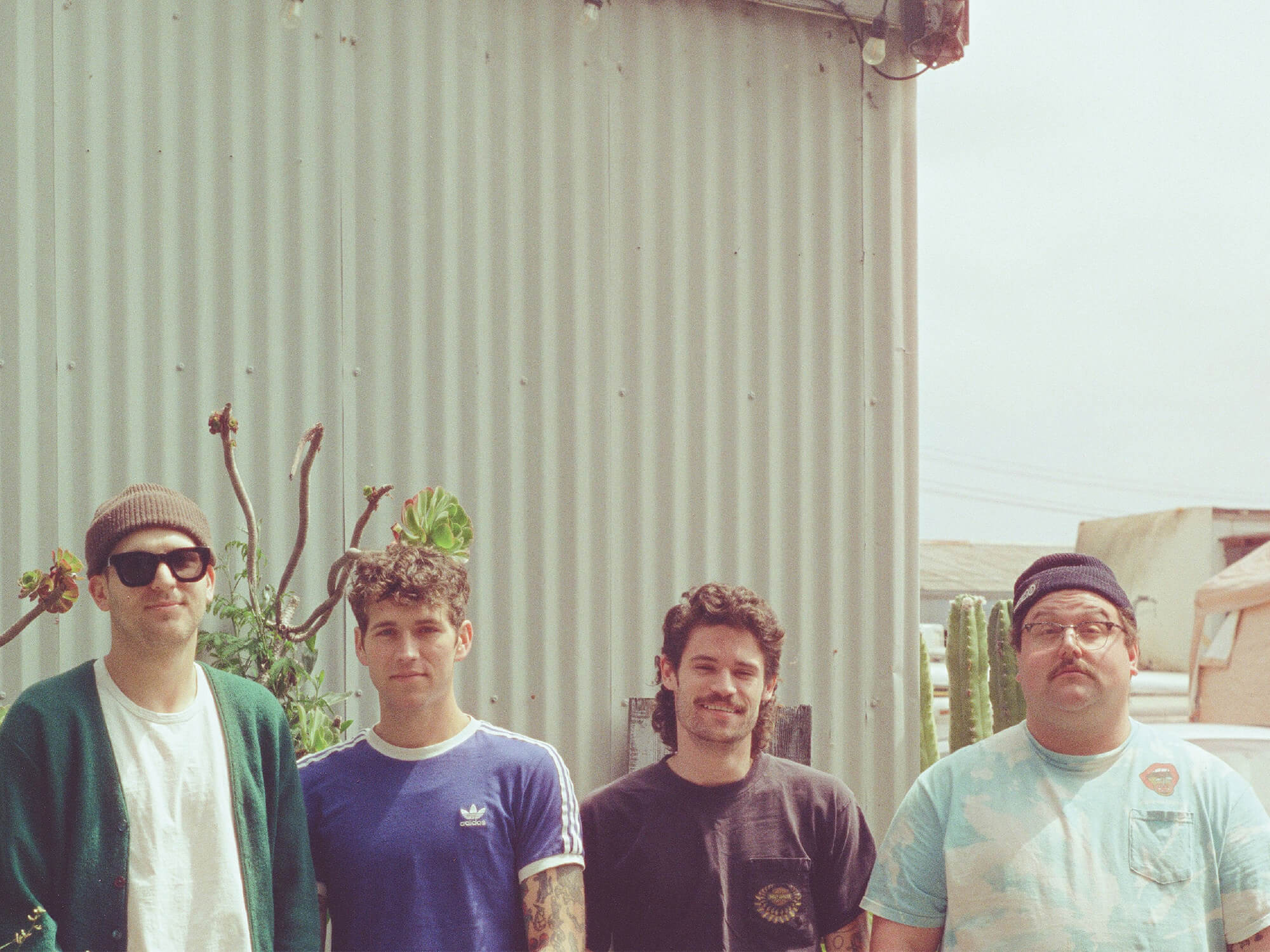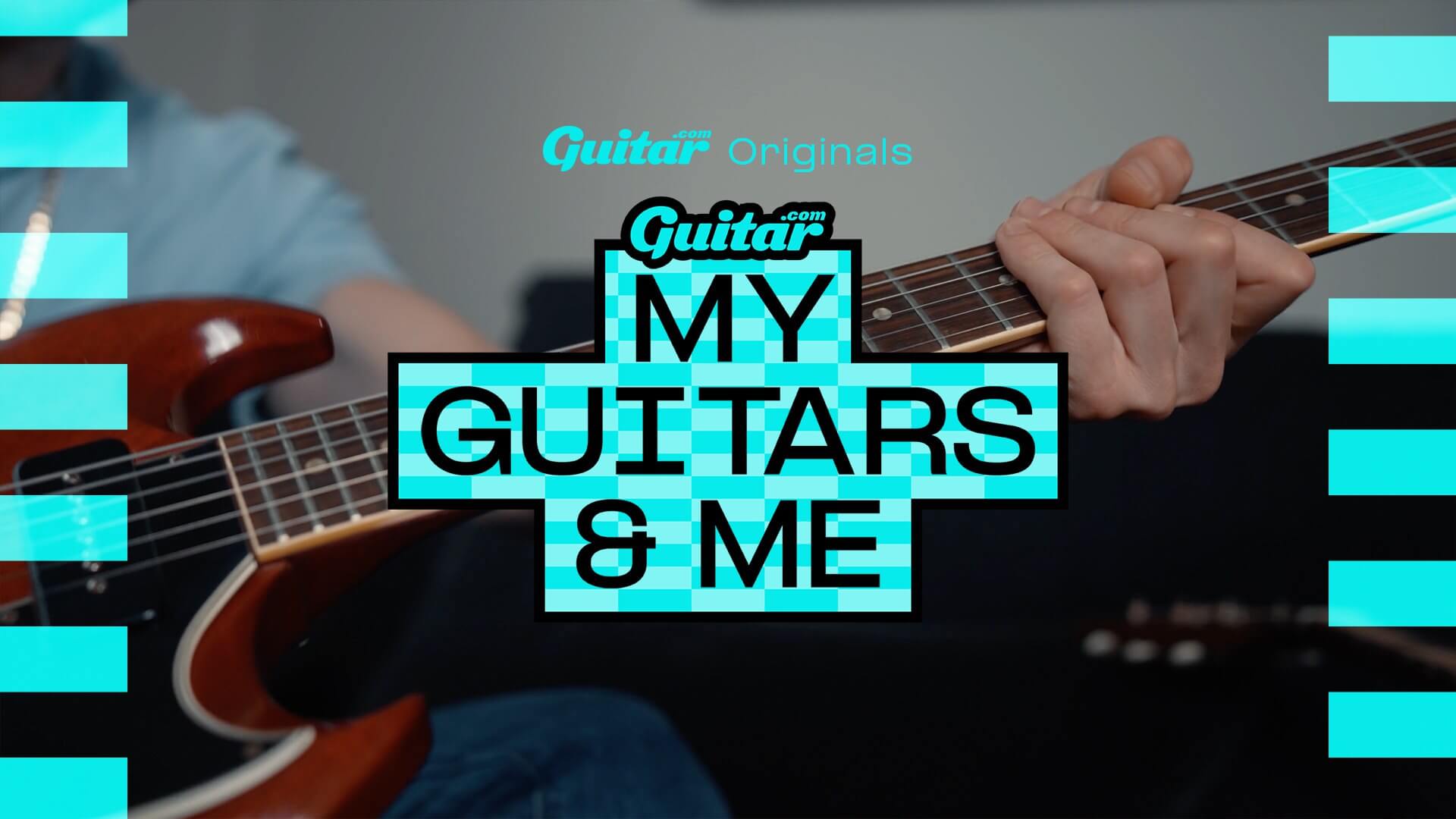Related Tags
Mom Jeans’ Eric Butler on reworking old songs for new acoustic record Bear Market
The pop-punk band’s latest isn’t your typical acoustic album.

Mom Jeans
Since their debut Best Buds, California’s Mom Jeans have been making emotional, hard-hitting and tightly written pop-punk, driven by frenetic guitars and Eric Butler’s expressive vocals.
But their latest album is something a little different: Bear Market features acoustic re-workings – and inventive renamings – of tracks from the band’s prolific back-catalogue. But make no mistake – this may be an acoustic album, it’s not an exercise in stripping tracks of their energy: instead, the band took the opportunity to expand the palette of textures they draw from, rather than just purely turn down the volume and pick up an acoustic.
The self-release arrived last month. We spoke with frontman Eric Butler about the process of putting Bear Market together.
What prompted the idea to rework your older material in the first place?
Now that Sweet Tooth has been out for a while and we’re nearing what feels like the end of the touring cycle for that album in particular, we were trying to think of ways that we could stay engaged with our audience and hopefully keep releasing some kind of content that would keep them interested in our band while we take time to step back and work on NEW new music next year.
Trying our hand at an “acoustic” album was one of the ideas that we and our managers kept going back to. It seemed like a fun and productive way to create something meaningful and time-withstanding that could stand to service our die-hard fans directly, but also possibly even create an opportunity for new listeners who maybe haven’t resonated with the original versions of the songs for whatever reason. Hopefully we’ve accomplished that!
While these are “acoustic versions”, there’s still loads of energy in these tracks. Some are even more up-tempo and intense than the original: what prompted you to up the intensity of tracks like Death Cup / death by cup?
Once we decided to really commit and book studio time for this project, I think we all collectively had a feeling that we didn’t want this album to feel half-baked or thrown together like some of the “acoustic versions” of songs that we’ve heard before. There are plenty of examples of poorly done acoustic versions of songs and there are also tons of examples of excellent acoustic songs that hit as hard if not harder than full-band. While it may have been tempting (and probably less expensive) to just record a simple acoustic version of every song we have with two acoustic guitars and two vocalists, we wanted to see if we could actually do somewhat of a remix on our own songs and hopefully create a version of the song that was as interesting if not more fun to listen to than the original recording.
In our minds, it seemed like a waste not to take everything that we’ve learned and experienced and built upon as musicians and songwriters in the past 8 years since our first LP and try to breathe new life into songs that have managed to find a place in our listeners’ daily rotations. We didn’t want potential listeners to feel like they already had to be fans of these songs for them to enjoy the album as a whole. It certainly took a lot more time and effort than just throwing up mics and playing the songs the way we always have, but we feel so much prouder and more accomplished of this project as a result. Everyone on the MJ team feels that Bear Market is actually its own album that can stand on its own two feet outside of the context of our previous works and hopefully that makes it more meaningful for the intended audience
Are there any bands in particular that you’d compare Bear Market’s overall sound to?
To be honest, we didn’t really try to specifically emulate any type of sound on this release. Oftentimes there’ll be albums that we reference during the recording (and especially mixing) process that can help inform the engineer and whoever is mixing the song, but with Bear Market we really hoped that each song would sound unique not only from its original version but also from other records that we might have heard.
That being said, as the project took shape and as we dove into alternate versions of each of the songs, we definitely took inspiration from a handful of places when deciding how to approach each track. The only two songs that I can think of that specifically remind me of another artist’s maybe “signature” sound are Tie Die and 10 Min.

The production style behind Tie Die is heavily inspired by the band Hovvdy, who all of us are big fans of, especially Sam (bass) and Austin (drums). Austin took the lead on Tie Die and recorded almost the entire song himself, and I think his vocal delivery and the layering of his vocal harmonies specifically is what invokes the Hovvdy sound in our ears.
The production of 10 Min is definitely heavily inspired by Kacey Musgraves, specifically the album Golden Hour. I love the lushness of this album and how she works elements of pop country into her albums, but the quality of her songwriting and the musicianship that is achieved by the performers on Golden Hour definitely set the bar – and it’s why we tried to work some more country elements like slide guitar and upright piano into the song.
What was the process for taking a song’s guitar parts and reworking them for this album?
With each song on Bear Market we really tried hard to get to the bottom of what made each song good or great or unique or what have you, and try to identify what we could change about the structure to maybe either beef up certain sections or trim the fat on others. The general structure of each song generally remained the same (with a few exceptions) and therefore the chord progressions did too, but aside from that we tried to reexamine and rebuild from the ground up what we felt a “normal” guitar sound could be and should be for each song
Some tracks are 100% acoustic with no re-amping or effects, and some of the tracks heavily rely on electric guitar for some of the most melodic and musical moments. We tried our best to let the songs guide us, and once we developed a rough idea of how we were going to approach each song we worked with our engineer Ben Hirschfield to decide which orchestration would best suit each track and make it shine the most.
The result was we used the same four guitars for the entire project, but which combination and whether or not/how much they get processed gave us a wide spectrum of different feels and settings with which to play with. I think it’s also worth giving major props to Ben and to Brett Romnes (who mixed Bear Market and Sweet Tooth) as their guidance and decision making in the recording/mixing process greatly infomed what would help us sound the best. We recorded a LOT of tracks and a LOT of different ideas trying to give Brett as much material to work with and he gets a lot of credit for sifting and sorting through all the material and helping us land on the best sounding result possible.
Mom Jeans has explored a range of production styles, from the more stripped-back sound of the earlier material to the fuller, more polished sound of last year’s Sweet Tooth. What did you learn from those records that you could bring to Bear Market?
I think the biggest thing we’ve taken away from the last 10 years of recording music together is that when we sit down to capture a song or an idea we all want to do things in a way that will best serve the art. It may sound a bit pretentious but it’s super easy to take the fun out of making art or making music by trying to contextualise it to an existing framework or scene or sound. Having a really good or solid idea about what you want to sound like can be great as a band, but it can also sometimes trap you in a mindset where you avoid growing and you rob yourself of motivational or inspirational experiences.
In some ways the bar has gotten lower in the sense that we in MJ are trying to keep our minds and ears open to anything that inspires us to write music or play our instruments. A lot of that is self-preservation and us trying to protect/maintain our own sense of joy in a large and scary industry, but it’s also because I want to stay connected to the very things that made me fall in love with music and fall in love with guitar in the first place.
Mom Jeans will always be a reflection of our love for live music and the resulting community, so in a way the music we make will always be a reflection of what we are currently experiencing/navigating as people. We can let that scare us/give us anxiety that people won’t like our band or connect with our music anymore, but I think we’ve found a lot of power in being honest with ourselves and each other about what makes us happy and excited and inspired.
I think Bear Market is a perfect reflection of that mentality because some of the songs are literally just acoustically tracked versions of the original song, some are more stripped down and intimate, some are totally reimagined with new sounds and parts, and some are just silly or crazy sounding for the sake of being weird. Rather than focusing on trying to make the songs all sound like they belonged on an album together, we tried to take the same exact approach with each song thereby forcing the process to be the unifying factor that ties the songs together and makes them feel like an album rather than the sonic landscape or the subject matter.
What was it like to revisit old lyrics? Were any in particular framed in a different light when you went back to them?
I’m not really sure I thought much about the lyrics in terms of the actual words themselves while making Bear Market. I think that people who like our band have certainly gotten attached to the lyrics in some sort of capacity, so in a way I felt like the lyrics specifically were one of the things we couldn’t really play with or change that much. I kind of focused more on the melodies and the vocal delivery of each lyric in a way that I felt like I didn’t really know how to on our first two albums.
I feel like I grew a lot as a vocalist during the process of writing and recording Sweet Tooth, so I think I was eager to have my vocals sound a lot better than I felt like they did on Best Buds or Puppy Love. I feel like I took the mentality that people who like these songs already will know the lyrics and the original melodies relatively well, so I wanted to try and play with the melody, cadence, harmonies, and vocal layering in ways that we never dreamed possible when we originally recorded some of these songs. For myself and Austin, taking our role as vocalists more seriously has been difficult, but as a band we feel like packing more and more vocal ideas and layers into our recordings as time goes on is something that we want to accomplish because we feel like it ultimately leads to a richer and more pleasurable listening experience.
Self-releasing records is more popular than ever right now – but are there challenges that come with doing a self-release rather than a label release?
There are definitely challenges that come with self-releasing. Spending your own money out-of-pocket for large expenses like album recording and PR and pressing vinyl doesn’t always feel super great. Having such a close relationship with your own bottom-line can sometimes keep you from making big moves and possibly turn your headspace more conservative than is beneficial to your band/project. Not to mention it’s tough being your own boss, some people have a really hard time navigating the business side of this industry (LLC, taxes, paychecks, insurance, etc.) and need a team of people to help them create art and show it off safely and efficiently. Not everyone is willing to risk having the fun taken out of being a band or risk their ability to be creative for the prospect of maybe saving money or feeling more in control of their career.
Management, labels, and all the other people who work on artists’ behalf definitely exist for a reason and can be super beneficial for people who aren’t as interested in the more nitty gritty side of the live music business. That being said, I personally believe that if done correctly the benefits of being an independent band in today’s changing landscape probably outweigh the downsides. The old model of “traditional record deals” is largely dead in my personal opinion, and I think that the only record labels that will continue to be impactful and meaningful as time goes on will be those who invest in their bands and invest in their bands’ communities and invest in the creation of meaningful and impactful art rather than focusing on profits and taking half of artists’ streaming income.
Like I said there are definitely challenges to running things yourself, but we in MJ are the type of people who would rather own our music, own our careers, and have the agency to do what we see fit. An independent band/artist like us may in theory have less resources at our disposal, but releasing music ourselves allows us to feel like we are living and dying by our own merits rather than gambling ownership of our art in exchange for possible success
What guitars did you use for Bear Market? Any weird/interesting acoustics?
We were lucky enough to get our hands on two really sick acoustics to borrow for the recording of Bear Market, both were leant to us by a friend. First we used a 1952 Martin 00-18 that was absolutely beautiful. I personally prefer parlor-style acoustics and this was basically everything I could ever want out of an acoustic guitar. Small but beefy neck, with incredibly sparkly and bright tone.
I used the Martin for most of my rhythm guitar tracks on Bear Market. The second guitar we borrowed is an insane Gibson SJ-200 Vintage prototype from 2016 that never made it to production because they would have been too expensive to produce (around 15k retail?). The SJ-200 is massive and totally tricked out with all the most beautiful aesthetics that Gibson could muster at the time. Bart really fell in love with this guitar and used it for most if not all of his rhythm tracks and leads. Most of the acoustic leads on the album are a double of each guitar playing the lead and with the exception of maybe Crybaby both guitars can be heard on every single song of this album.
What about the electric parts?
We used a sweet Nash T-63 Telecaster that belongs to our engineer Ben for some of the electric leads. I think our tech/friend Matt played it for the leads that he helped us record. The other cool electric we used is a 2002 Gibson ES-333 in walnut that our bassist Sam recently acquired. Sam’s 333 is probably one of the most beautiful guitars that I’ve ever seen or heard, it was a huge treat to use. I think the coolest thing we pulled off with electric guitars was the use of an ebow in a handful of the tracks to build a bunch of somewhat synth-y spacey layers which was new sonic territory for us.
Who in particular would you say influenced your guitar playing style?
If I had to pick one iconic guitar player who has influenced me it would probably be Tom Delonge. His mentality and honesty about not being the best guitar player, but using the guitar as a tool to write songs and express emotion and have a safe space is something that I’ve always connected with. Guitar is something that has always made me feel excited, but I’ve never been the best player. Guitar has always been my foundation for songwriting and therefore a foundation for self-expression which very few other things in life have been able to give me.
There are very few places I feel as happy as when I’m performing with my band and the guitar is the tool and the vehicle with which I get to accomplish that. In all honesty though, I have probably found myself more inspired or influenced by my friends and peers who I grew up playing music with and going to their shows as a teenager/young adult. There has always been something very influential to me about seeing people you know or know of be really good at something that makes chasing your dreams feel more accessible.
People like Matt Yankovich (Just Friends/Happy Diving/my friend) have given me invaluable amounts of insight throughout the years and I have even learned so much and been so influenced by just my bandmates and close friends and their playing styles alone. I feel like I’ve been lucky enough to brush shoulders with a handful of (I believe) some of the most talented songwriter-guitarists who not only are incredible lyricists and song crafters but also low-key super talented guitarists.
People like Cory Castro (Free Throw), Kory Gregory and Cam Handford (Prince Daddy & The Hyena), Jade from Oso Oso, Kerry Alexander (Bad Bad Hats), Kris Ward (sports/snack’d out), Lindsey Jordan (Snail Mail), Matt Berry (The Berries/Happy Diving), Neil Berthier (Phony/Joyce Manor/Donovan Wolfington), Scott Ayote (Born Without Bones/The Hotelier), Christine Goodwyne (Pool Kids) all leave me speechless when I see them perform and I leave their shows wanting to get better as a musician and as a guitar player.
Getting to absorb inspiration and excitement and knowledge from talented folks will always be something that keeps me coming back to music and to the guitar in particular because it’s such a perfect vehicle for connection and shared excitement which is what I love about music as a whole, so much.




